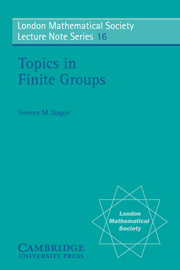Summary
The following material is selected from a course of lectures given at the University of Florida in Gainesville, Florida during 1971/72. The reader is expected to have read both Gorensteins' Finite Groups and much of Huppert's Endliche Gruppen I. In particular he must be familiar with the concepts of p-constraint and p-stability in order to begin, although there is a short discussion of these concepts in an appendix here.
The topics covered are such that I feel rather diffident about publishing these notes at all. The title should perhaps be changed to something like ‘Lectures on some results of Bender on finite groups’. No less than three of his major results are studied here and of course the classification of A*-groups depends on his ‘strongly embedded subgroup’ theorem - which is not studied here at all. I feel that the theorems and techniques of the papers ‘On the uniqueness theorem’ and ‘On groups with abelian Sylow 2-subgroups’ are too important for finite groups and much too original to remain, as at present, accessible only to a very few specialists. I think that I understand the motivation for the abbreviation of the published versions of these two results. However, though it is clear that a proof becomes considerably more readable when a two or three page induction can be replaced by the words ‘By induction we have’, these details must sometime be filled in.
- Type
- Chapter
- Information
- Topics in Finite Groups , pp. viiPublisher: Cambridge University PressPrint publication year: 1976



